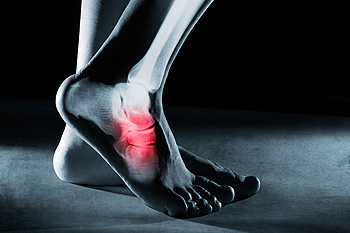 Cuboid syndrome is caused by partial dislocation of bones in the middle of the foot. Someone with cuboid syndrome usually feels pain around the middle of the foot or at the base of their toes. There are some symptoms of this condition that, when coupled together, can help to identify cuboid syndrome. Pain on the lateral side of the foot or the side of the little toe is an initial indicator. Pain also tends to worsen when weight is placed on the foot, so activities like walking or jumping may trigger discomfort. It is also possible for the foot to swell and for there to be a reduced range of motion in the foot or ankle. If you suffer from any of these symptoms and think you might have cuboid syndrome, it is highly recommended that you speak with a podiatrist to begin treatment.
Cuboid syndrome is caused by partial dislocation of bones in the middle of the foot. Someone with cuboid syndrome usually feels pain around the middle of the foot or at the base of their toes. There are some symptoms of this condition that, when coupled together, can help to identify cuboid syndrome. Pain on the lateral side of the foot or the side of the little toe is an initial indicator. Pain also tends to worsen when weight is placed on the foot, so activities like walking or jumping may trigger discomfort. It is also possible for the foot to swell and for there to be a reduced range of motion in the foot or ankle. If you suffer from any of these symptoms and think you might have cuboid syndrome, it is highly recommended that you speak with a podiatrist to begin treatment.
Cuboid syndrome, also known as cuboid subluxation, occurs when the joints and ligaments near the cuboid bone in the foot become torn. If you have cuboid syndrome, consult with Dr. Barbara Kilkenny from Barbara A. Kilkenny, DPM. Our doctor will assess your condition and provide you with quality foot and ankle treatment.
Cuboid syndrome is a common cause of lateral foot pain, which is pain on the outside of the foot. The condition may happen suddenly due to an ankle sprain, or it may develop slowly overtime from repetitive tension through the bone and surrounding structures.
Causes
The most common causes of cuboid syndrome include:
Symptoms
A common symptom of cuboid syndrome is pain along the outside of the foot which can be felt in the ankle and toes. This pain may create walking difficulties and may cause those with the condition to walk with a limp.
Diagnosis
Diagnosis of cuboid syndrome is often difficult, and it is often misdiagnosed. X-rays, MRIs and CT scans often fail to properly show the cuboid subluxation. Although there isn’t a specific test used to diagnose cuboid syndrome, your podiatrist will usually check if pain is felt while pressing firmly on the cuboid bone of your foot.
Treatment
Just as the range of causes varies widely, so do treatments. Some more common treatments are ice therapy, rest, exercise, taping, and orthotics.
If you have any questions, please feel free to contact our office located in Southbury, CT. We offer the newest diagnostic and treatment technologies for all your foot care needs.
Read more about Cuboid Syndrome